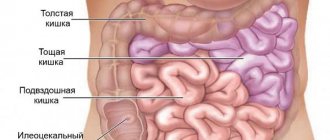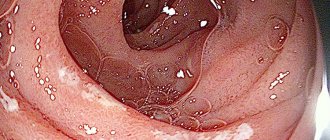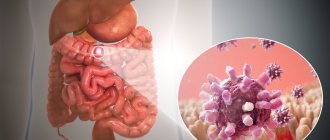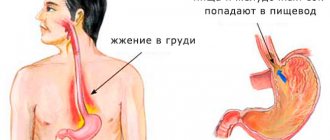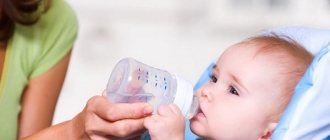Causes
Many factors can trigger irritable bowel syndrome in a child. In most cases, the cause of the disease is errors in nutrition and pathology of the digestive system. IBS can be inherited. In some cases, the causes of the pathology remain unclear.
For example, if a child has an altered intestinal pain threshold, then the risk of irritable bowel syndrome will be maximum.
Causes of IBS:
- consequences of acute intestinal infections;
- hereditary predisposition;
- psychological trauma and frequent stress;
- consequences of helminthic and parasitic infestations;
- progressive inflammatory processes in the large intestine;
- individual intolerance to certain food groups;
- introducing complementary foods or formulas to replace breast milk too early;
- dysbiosis caused by long-term use of antibiotics;
- deficiency of dietary fiber in the diet.
Pathogenesis
The most common cause of IBS in children is changes in the visceral receptors of the intestines and stomach. Such a reaction can occur under the influence of a number of factors (food allergies, damage to the digestive system by infections, parasites, etc.).
The result of a violation of the pain sensitivity threshold of the gastrointestinal tract is a change in the level of enkephalins. These substances are proteins with a morphine-like effect. They affect certain groups of receptors and provoke acceleration of peristalsis (the process is accompanied by severe pain). Symptoms can be aggravated by accompanying hormonal imbalances.
At-risk groups
The risk group for IBS includes children with a hereditary predisposition to diseases of the digestive system, as well as lability of the nervous system.
An important role in preventing irritable bowel syndrome is played by proper feeding of the baby from the first days of life and careful attention to his health. Children exposed to inadequate care are more likely to suffer from gastrointestinal disorders (for example, children from disadvantaged families).
Other risk groups:
- children starting to attend kindergartens and schools (changes in diet and diet);
- babies who switch to artificial feeding early;
- identical twins (in fraternal twins, IBS is diagnosed less frequently).
Causes and symptoms of intestinal dysfunction
Human internal organs: intestines
Intestinal dysfunction occurs in people of all ages: from children to adults. The most common reason for the development of the disease is the constant stress of the patient. Also, the reasons for the development of intestinal dysfunction may be:
- acute intestinal infections
- chronic gastrointestinal infections
- parasitic infections
- dysbacteriosis
In addition to various infectious diseases, the cause of intestinal dysfunction may be individual intolerance to certain foods from the diet. Therefore, in some cases, the disease occurs after excessive consumption of fatty foods or foods that contain large amounts of fiber.
Sometimes allergic reactions to certain foods can cause intestinal dysfunction. Also, it occurs when eating incompatible products or bad, low-quality food. It is important to remember that as pathology develops in the intestines, toxins begin to appear in it, which have a bad effect on the patient’s entire body.
Intestinal dysfunction in women can occur for special reasons. It occurs during the menstrual cycle, due to various hormonal disorders that can sometimes appear. Intestinal disorder is characterized by various negative symptoms. These include:
- bloating
- pain in the intestinal area
- diarrhea
- constipation
Therefore, if any examination does not reveal an objective reason for the occurrence of any of the above symptoms, then they may be caused precisely by intestinal dysfunction. Pain in the abdominal area most often appears in the morning, after sleep. They are characterized by varying intensities and can be either tolerable or quite strong.
Also in the morning, the patient may suffer from flatulence and constant diarrhea. It is accompanied by a constant feeling of fullness in the intestines, which sometimes does not disappear even after defecation. In addition to all this, the patient experiences rumbling in the stomach, and mucus can often be found in the stool.
Pain and diarrhea, with intestinal dysfunction, can often be especially pronounced after eating or during stress. Some people may experience tenesmus, a false urge to defecate, during which pain or discomfort is felt in the rectum.
These symptoms of intestinal dysfunction can manifest themselves differently in different patients: in some they are pronounced, in others it’s the opposite. However, if any symptoms do arise, then this is a completely objective reason to consult a specialist.
Read: Analysis of the reasons that provoke burning in the anus in women
Intestinal disorder is a disease that has a number of causes. It is accompanied by various symptoms, the manifestation of which is expressed differently in different people. The most common of them are: constipation, diarrhea, pain in the abdominal area. If these symptoms occur, it is advisable to seek advice from a specialist.
Classification
IBS is divided into several categories depending on the symptoms that occur. Irritable bowel syndrome may occur with constipation, diarrhea, mixed or unclassified type. In the first case, solid feces predominate in the stool (bowel emptying is difficult), in the second - liquid. With the mixed type, constipation is replaced by diarrhea.
Unclassified IBS is difficult to classify into any group due to the presence of mixed symptoms.
Code in ICD-10
According to ICD-10, irritable bowel syndrome is assigned code K 58. Pathology with a predominance of diarrhea is marked with code K 58.0, with a predominance of symptoms of constipation - K 58.9.
Symptoms
The main symptoms of irritable bowel syndrome in children are sharp abdominal pain that decreases or goes away after defecation, flatulence and alternating constipation with diarrhea. The general condition of the child depends on the form of IBS. In some cases, the main symptoms may be accompanied by external intestinal manifestations such as insomnia, excessive sweating, rapid heartbeat or respiratory dysfunction.
Symptoms of IBS depending on the form of pathology:
- with irritable bowel syndrome with diarrhea at night, the child has no stool, defecation occurs mainly in the morning (liquid stool, the process of bowel movement is carried out several times in a row after a short period of time, spastic pain of varying intensity may occur in the right iliac region);
- when constipation predominates, the process of bowel movement does not occur regularly, the stool may change its consistency (defecation is carried out several times a week, after constipation diarrhea may occur, pain in the intestines may be constant or periodic);
- with unclassified IBS, the symptoms of diarrhea and constipation alternate (the child exhibits all the signs of pathology, including pain, external intestinal manifestations and general weakness of the body);
- Regardless of the form of IBS, a child may experience symptoms such as bloating, mucus in the stool, attacks of vomiting or nausea, sour belching, excessive anxiety or irritability.
Diarrhea in children: etiology of acute and chronic intestinal infection
Diarrhea is frequent bowel movements with changes in bowel movements (from mushy to watery) .
This is the main symptom of various intestinal disorders in a child: acute infections caused by bacteria (escherichiosis, salmonellosis, dysentery, cholera, staphylococcal diarrhea), viruses (rotavirus, adenovirus infection, etc.), parasites (amebiasis, giardiasis); dysbacteriosis (complication of antibacterial therapy). Diarrhea can also be a sign of functional disorders (intestinal dyskinesia in children, irritable bowel syndrome, conditions after stem vagotomy), fermentative and putrefactive dyspepsia, mycoses, enteropathy (celiac disease, lactase and disaccharidase deficiency), nonspecific inflammatory processes (ulcerative colitis, enteritis, diverticulitis , Crohn's disease).
The etiology of this intestinal infection in children may be associated with acute surgical diseases (intussusception, acute appendicitis), diseases of the pancreas (chronic pancreatitis), liver and biliary tract, complicated by acholia (development of obstructive jaundice). Diarrhea can also occur due to toxic effects (poisoning with heavy metal salts, alcohol poisoning, drug intoxication), systemic diseases (dermatomyositis, polyarteritis nodosa, scleroderma), gastrointestinal neoplasms, kidney diseases accompanied by uremia, as well as endocrine glands (diabetes mellitus, thyrotoxicosis, Addison's disease), allergic reactions, vitamin deficiencies (beriberi, pellagra, etc.), neuroses, conditions after surgical interventions on the gastrointestinal tract.
Intestinal infection diarrhea in children can be acute or chronic. Diarrhea is considered acute if its duration does not exceed 2-3 weeks. and there is no indication in the anamnesis of such episodes. Chronic diarrhea lasts more than 3 weeks. With watery diarrhea, the amount of water in the stool increases from 60 to 90%. In patients with impaired absorption of nutrients, polyfecalia predominates, i.e., an unusually large amount of feces with undigested food debris. If intestinal motility is impaired, stool may be frequent and liquid, but the daily amount of feces does not exceed the age norm. On an empty stomach, the intestines contain little fluid. During the process of natural digestion, the total volume of liquid in the gastrointestinal tract increases significantly, but almost all the liquid is absorbed in the duodenum and small intestine, only a small amount is absorbed in the large intestine and about 50-100 ml is excreted with feces.
Diagnostics
The process of diagnosing IBS is difficult in children of a younger age category. In babies, irritable bowel syndrome is often mistaken for infant colic. The diagnosis can only be confirmed by a comprehensive examination, in which a pediatrician, gastroenterologist, endocrinologist, proctologist and coloproctologist should take part.
If IBS is suspected, the child is prescribed a specific list of tests and procedures.
The following methods are used to diagnose IBS:
- biochemical and clinical blood test;
- stool occult blood test;
- bacterial culture of stool on the intestinal group;
- fecal analysis for helminths;
- examination for dysbacteriosis;
- ultrasonography of the large intestine;
- Ultrasound of the abdominal organs;
- irrigography;
- endoscopic examination;
- X-ray of the stomach.
Intestinal dysfunction in a child
Intestinal dysfunction occurs quite often in gastrointestinal patients
Intestinal upset in children is a fairly common disease, so parents need to know what can cause it. In young children, intestinal disorders may be caused by insufficient development of the digestive system, which is not adapted to the normal absorption of certain foods. Older children may suffer from bowel dysfunction for the same reasons as adults.
The differences are that in children and adults the disease progresses with some differences. Children are less tolerant of diarrhea and the symptoms that accompany it. Intestinal dysfunction in children lasts longer than in adults and does not go away on its own. The baby's body needs help to fight the disease. Parents should carefully follow the instructions of the pediatrician, since there is a danger that ordinary diarrhea will develop into dysbiosis, and this is a much more serious disease.
Deviations from the normal functioning of the digestive system leads to disruption of various metabolic processes, which leads to a general deterioration in the condition of all body systems. Among them we can highlight:
- decreased immunity
- Decreased attention and memory of the baby
- lethargy
- increased irritability
Read: Baby has green stool: should you start getting nervous?
In children, this disease can be infectious or non-infectious in nature. The former are easier to diagnose and treat, but the latter will require a more serious analysis of symptoms and various tests. For non-infectious diarrhea, your doctor may prescribe medications designed to combat microbes: the most likely culprits of the disorder. Inadequate treatment of diarrhea in a baby can lead to an acute form of the disease, which usually resolves within a week.
Bowel dysfunction has many additional symptoms
In cases where diarrhea and accompanying symptoms last longer than usual, a chronic bowel disorder may be present. This form of the disease is characterized by the fact that even after the diarrhea stops, isolated cases of nausea and vomiting and sudden rises in the baby’s temperature are possible.
Diarrhea in older children can be caused by an incorrect diet, lack of various vitamins, poisoning with bad food, infections and allergic reactions. If diarrhea lasts more than a day, then it is highly advisable to seek help from a specialist doctor.
These symptoms can be caused by certain diseases of children (scarlet fever, measles), which are not recommended to be treated independently, as this is dangerous for the child. The attending physician will conduct the necessary diagnostics and prescribe the correct treatment. Bowel disorders in children vary depending on their age. So, in children under one year old, it can be caused by insufficient development of the digestive system, and in older children, the reasons for intestinal dysfunction may be similar to the reasons for this disease in adults.
If various symptoms of pathology occur in a child, you should definitely consult a doctor, since self-medication in this case can be dangerous to the baby’s health.
Intestinal dysfunction is a disease that affects up to 20% of the adult population of the planet. It can be characterized by various symptoms: abdominal pain, constipation, diarrhea. When treating a disease, it is necessary to correctly determine its cause, and then prescribe an adequate course of treatment, supported by a special diet.
Intestinal dysfunction in children is somewhat more dangerous than in adults, especially if the child is less than one year old. Treatment of the disease in this case must be carried out only depending on the recommendations of a specialist doctor.
Read along with this article:
- Intestinal spasms - causes, symptoms, treatment and prevention
- Symptoms and treatment: intestinal adhesions
- Diarrhea after every meal, causes and treatment methods
- Stomach bloating, causes, treatment and diet for bloating
- Feeling of nausea, its types and causes
- Pain in the rectum and lower abdomen: what is evidenced by...
- Colitis and its possible manifestations, symptoms, forms and…
- Candidiasis of the rectum, what kind of disease it is, its symptoms and...
- Thrush in guys. The reason is dysbacteriosis???
Complications and consequences
In the absence of adequate treatment, IBS can become a chronic pathology. With regular constipation, there is a risk of developing intestinal obstruction and other serious diseases of the digestive system. Some of the complications will significantly reduce the child's quality of life and will require constant use of certain medications.
Possible consequences of IBS:
- dehydration (with uncontrolled use of laxatives);
- gastric bleeding and necrosis of the mucous membranes of the digestive system;
- abnormalities in kidney function;
- disorders of the cardiovascular system;
- chronic pathologies of the digestive tract;
- psychical deviations.
Doctor Komarovsky's opinion
Diarrhea and vomiting are powerful natural mechanisms for removing toxic substances from the body. Most often, loose stools are a consequence of pathogenic microbes entering the gastrointestinal tract due to poorly washed vegetables and fruits, licking dirty hands, drinking unpurified water, and helminthic infestations. Some viruses cause stool upset by entering the body through the mucous membranes and causing inflammation, which is why diarrhea occurs.
Not every uncontrollable, repeated loose bowel movement in a child can rightly be called diarrhea. It all depends on the baby’s age and type of feeding. The true cause of the disorder will be determined by the doctor in order to avoid unpleasant consequences and not miss time for treatment, since it is necessary to act in two directions: minimizing the consequences of diarrhea and eliminating the cause of its occurrence. Therapy for diarrhea is aimed at restoring the mucous barrier of the intestinal walls and eliminating foci of intoxication in the gastrointestinal tract. You should not hesitate to drink if your baby has loose stools. At the pharmacy it is worth purchasing special mineral solutions that help prevent rapid dehydration of the patient. Drinking plenty of fluids is an important thing that a mother should provide if her child has diarrhea.
Treatment of irritable bowel syndrome in children
The treatment regimen for IBS in children is drawn up based on the individual clinical picture of the child’s condition. Correction of the diet and symptomatic treatment are mandatory.
If a child is diagnosed with hypermotor dysfunction of the digestive system, then electrical stimulation of the abdominal area, massage of the anterior abdominal wall, or paraffin baths are prescribed as an addition to therapy.
Medication
One of the main methods of treating IBS in children is drug therapy. The list of prescribed drugs depends on the form of the pathology and the general condition of the child. It is not recommended to create a therapy schedule on your own. Otherwise, the risk of complications increases.
Treatment should include not only medications that relieve symptoms of IBS, but also restorative medications to improve the functioning of the gastrointestinal tract.
Examples of drugs for the treatment of IBS:
intestinal antiseptics (Intetrix, Furazolidone);- drugs from the group of enzymes (Creon, Pancreatin);
- laxatives (preparations containing lactulose);
- prebiotics (Dualac);
- prokinetics (Domperidone);
- probiotics (Bifiform, Linex);
- antidiarrheals (Imodium);
- carminatives (Espumizan).
Dietary supplements and herbs
Biologically active food supplements help improve the functioning of the digestive system, but they cannot replace medications for IBS. Such funds can be used to prevent abnormalities in the gastrointestinal tract. For irritable bowel syndrome, dietary supplements Narine or Bifiform are highly effective.
These products contain probiotics and prebiotics. A similar rule applies to herbal medicine.
Herbs to improve the digestion process:
- mint;
- aloe;
- chamomile;
- fennel;
- nettle;
- valerian;
- sage;
- ginger;
- cinnamon.
Traditional medicine
Alternative medicine prescriptions for IBS are used as an adjunct to primary therapy. When selecting such products, it is important to take into account the individual characteristics of the child’s body (children may have an allergic reaction to some components). If you use folk remedies as a replacement for drug therapy, a temporary improvement in the functioning of the digestive system may give way to serious complications.
Examples of folk remedies:
- infusion of pomegranate peels (the recipe is used as a fixative for diarrhea, pomegranate peels should be poured with boiling water, left for 30 minutes, it is recommended to take a tablespoon before each meal);
- tea based on mint (mint leaves are poured with boiling water, infused for 10 minutes, the product should be taken in small portions throughout the day, honey can be added to improve the taste of the drink);
- apples (the child needs to eat one medium-sized fruit daily; apples improve the digestion process and contain many elements useful for the gastrointestinal tract).
Diet
A mandatory step in the treatment of IBS is diet. Changing the diet will help not only normalize the functioning of the digestive system, but also speed up the child’s tendency to recovery.
Meals should be eaten in small portions (5-6 times a day in small portions). Products must undergo full heat treatment.
General recommendations:
- Fried and fatty foods, chocolate, muffins, cocoa and strong tea should be excluded from the diet of a child with IBS;
- Do not consume carbonated drinks and foods that increase gas formation (for example, white cabbage or legumes);
- during therapy, whole milk products are excluded from the child’s diet (fermented milk products are not only allowed, but also recommended for consumption);
- pickles, canned food, marinades, spices and seasonings must be excluded from the diet;
- Rice water or porridge improves the functioning of the digestive system;
- meat for baby food is selected from low-fat varieties (children can only consume such products in boiled form);
- the menu should include berry-based jelly, semolina porridge, soups, black currants and blueberries;
- For constipation, the menu must include vegetables and fruits rich in dietary fiber.
Clinical guidelines
To speed up the recovery trend in IBS, parents need to follow a number of important rules. Experts recommend keeping a special “food diary” in which the reactions of the baby’s digestive system to certain foods and his diet are recorded.
If IBS symptoms return, the doctor will be able to create the most effective course of treatment by analyzing the records.
Other clinical recommendations:
- providing the child with daily walks in the fresh air and sufficient physical activity;
- control of diet and proper menu planning;
- compliance with the therapy schedule and all doctor’s recommendations;
- creating a favorable atmosphere with the exception of stressful situations.
Treatment of bowel dysfunction
The doctor needs to determine the cause of intestinal dysfunction
Before treating intestinal dysfunction, the doctor must determine the cause of the disease. If the reason for its development was a long-term stressful condition, then the attending physician can recommend the patient various relaxing activities: yoga, running, jogging, walking in the fresh air.
They help relax the body and stabilize the nervous system. If the stressful state does not go away and accompanies the patient for a very long time, then various sedatives and antidepressants may be prescribed.
If the causes of intestinal dysfunction are something else, then depending on them, the following medications may be prescribed:
- antispasmodics - to combat pain
- laxatives – to combat constipation
- antidiarrheals – to combat diarrhea
To relieve pain due to intestinal dysfunction, Sparex, Niaspam, Duspatalin, etc. are often used. They have a relaxing effect on the intestines and promote normal contraction. However, in some cases their use is prohibited because they contain peppermint oil, which should not be taken by women during pregnancy.
Another name for bowel dysfunction is irritable bowel syndrome.
Laxatives soften stool and help normalize the bowel movement process. While taking these medications, the patient should drink plenty of fluids to protect the body from dehydration. Bowel dysfunction accompanied by diarrhea will require the use of various binding agents, such as imodium and loperamide.
Read: Rectal fistula: causes, symptoms, how to treat rectal fistula
They slow down intestinal motility and increase the length of time stool remains in it. As a result, liquid stool has more time to thicken and bowel movements are normalized.
For intestinal disorders, it is recommended to follow various diets, the therapeutic effects of which are similar to those of medications. Patients who suffer from constipation need to take more fluids, eat bran bread, various oils, fish, meat, and cereals. At the same time, it is extremely undesirable for them to consume coffee, jelly, chocolate and pastries made from butter dough.
In case of diarrhea, food that accelerates intestinal motility and the process of emptying should be excluded from the patient’s diet. The diet may include coffee, tea, and dry biscuits. It is recommended to consume kefir and cottage cheese, while eggs and meat are excluded for a while.
Special additives containing beneficial bacteria can be added to food to help normalize intestinal function.
Treatment of intestinal dysfunction is carried out depending on the reasons that caused the disease. If the cause of the disease is stress, then activities and medications that have a calming effect on the nervous system are recommended. For constipation and diarrhea, it is recommended to take special medications and various diets that help normalize intestinal functions.
Psychotherapy
With IBS, children may experience abnormalities in the nervous system. To treat mental disorders, special therapy is prescribed. In some cases, a child may need the help of a psychologist (with anxious and suspicious moods, depression, phobias, irritability or impulsive behavior). The duration of therapy depends on the general state of the baby’s psyche and the reasons that provoked IBS.
Psychotherapy includes the following techniques:
- Gestalt therapy;
- training in conflict-free communication;
- relaxation techniques;
- interpersonal therapy;
- Ericksonian hypnosis.
Forecast
Favorable prognosis for IBS is only possible with timely diagnosis and adequate treatment of the pathology. Following your doctor's recommendations greatly reduces the risk of complications. If therapy is carried out incorrectly or is absent, then the consequence of irritable bowel syndrome can be dangerous conditions - intestinal obstruction or dehydration. As they progress, the child’s life will be threatened.
Prevention measures
If your child develops symptoms of IBS, you should consult a doctor and undergo an examination. Ignoring constipation or diarrhea, as well as their untimely treatment, can negatively affect your overall health and cause serious complications. Control of a baby’s diet should be carried out from the first days of his life. Experts recommend prolonging breastfeeding as much as possible.
Preventive measures:
- providing the child with proper and nutritious nutrition (foods should be rich in vitamins);
- prevention of traumatic factors (the child should grow up in a prosperous atmosphere);
- Complementary feeding of babies should be carried out in accordance with age;
- All diseases in a child must be treated fully and in a timely manner.
Treatment
Rehydron mixture will help solve the problem of lack of fluid in the child’s body.
The main symptoms of intestinal dysfunction in children under 5 years of age are diarrhea and vomiting, as a result of which water and salts are removed from the body. Therefore, it is very important to start giving your child plenty of fluids from the first days. You can replace fluid loss with tea, compotes, fruit drinks, glucose solution or the Regidron mixture, which is sold in powder form at the pharmacy. A rehydration solution will ease the baby's condition. To do this, you need to take 1 teaspoon of sugar and a pinch of salt for one glass of water. You can add a few drops of lemon juice to improve the taste of the drink.
The more often and more the child drinks, the faster his condition will stabilize. The interval between doses should be 10 minutes; it is enough to drink little by little.
Medicines
Children can be given the following medications:
- "Smecta" is allowed for children over one month old. This drug is a cytomucoprotector and is characterized by absorbent and astringent properties.
- The most popular tool is Linex. It brings the intestinal microflora to a normal state, but it has a contraindication: increased intestinal sensitivity.
- "Hilak Forte" can be prescribed to babies from the first days of life. The active ingredient of the medicine is lactic acid.
- "Normobakt" contains bifidobacteria and lactobacilli. It is prescribed to children from 6 months of age in case of mild dysfunction.
There are often cases when dysfunction in a child is accompanied by elevated temperature. If your body temperature has increased to 38 degrees or higher, you need to bring it down. For intestinal upset, antipyretic drugs containing paracetamol are recommended. It is better to give preference to medications in the form of tablets or syrups. The use of suppositories with paracetamol during this period is difficult. However, when the frequency of stool is less than 10 times a day, their use is justified and has an effective effect.
Diet for infants and newborns
There are several rules that must be followed:
- It is necessary to not give the baby complementary foods for some time and see how well the mother’s diet meets the baby’s needs.
- When artificial feeding, it is recommended to take a break between feedings of at least 8 - 12 hours, and then give the baby fermented milk mixtures.
- If the child is 6 months old, he can be fed a formula to which rice water has previously been added.
Only after the condition has completely improved, children under one year of age are allowed to return to their normal feeding schedule. Other products must be added to the baby’s diet gradually: on average, one product every two days.
Diet for children after one year
If signs of intestinal distress appear, the baby should be provided with a special diet regimen. As a rule, the diet should contain:
- rice porridge;
- soups with pureed vegetables;
- mashed potatoes;
- kefir;
- oven-baked apples;
- biscuits or crackers.
Food should be cooked only in water, without adding oil. The consumption of certain foods is prohibited during this period. This applies to:
- milk and dairy products;
- raw fruits and vegetables;
- fatty foods.
Meals should be divided into small portions.
Traditional methods
The simplest and most effective remedy for restoring intestinal function is considered to be rice water. To prepare it you will need rice and water in a ratio of 1:3. The rice is poured with water and boiled over low heat for 5 - 7 minutes. Then you need to cool the product and give the baby 50 - 100 ml every hour.
It is recommended to prepare a decoction of chamomile and mint in a 1:1 ratio. For 200 ml of boiling water, take 1 tbsp. spoon of herbal mixture. After half an hour, the liquid is filtered. You need to drink half a glass of the decoction several times a day.
If you have dried blueberries at home, you can make jelly from them. It is necessary to combine 1 tbsp. spoon blueberries and starch, add a little water and mix well. Gradually add 1 more glass of water and boil. It is recommended to take jelly warm.




